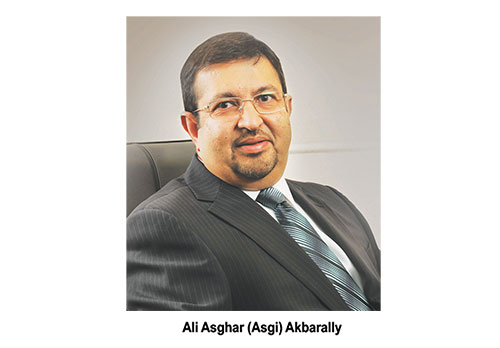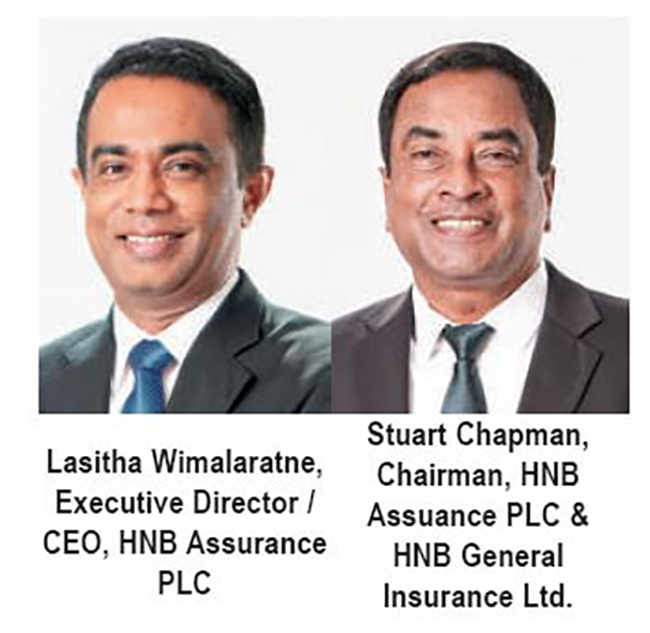Business
Asgi Akbarally appointed Amãna Bank chairman

Ali Asghar (Asgi) Akbarally has been appointed as Chairman of the Board of Directors of Amãna Bank upon the retirement of the Bank’s Founder chairman Osman Kassim. Leaving a strong legacy in the Islamic banking industry in Sri Lanka, Osman Kassim retired from Amãna Bank having completed the maximum 9 year statutory period of holding a directorship in a Licensed Commercial Bank as per CBSL directions. Despite retiring from the bank, Osman Kassim continues to be one of the bank’s top 10 shareholders.
Asgi Akbarally joined the Board of Amãna Bank in July 2020 as the nominee director from Akbar Brothers, taking over the position vacated by Tyeab Akbarally, who also retired upon completing the maximum 9 years of directorship as per CBSL regulations.
Asgi Akbarally is an Executive Director of Akbar Brothers (Pvt) Ltd, one of Sri Lanka’s largest diversified corporates, globally renowned for its tea exports. Asgi Akbarally holds directorship in multiple subsidiaries and affiliates of the Akbar Group covering sectors such as Manufacturing, Property Development, Hotels & Leisure, Healthcare, Power Generation, Packaging & Printing, Logistics and Environmental Services. He is the Managing Director of Renewgen (Pvt) Ltd and chairman of Windforce (Pvt) Ltd, Hermitage Resorts (Pvt) Ltd, Uthurumaafaru Holding (Pvt) Ltd Maldives, Lhaviyani Holdings (Pvt) Ltd and Cocoon Investments (Pvt) Ltd Maldives. He is also a director of Alumex PLC.
Asgi Akbarrally is currently the Honorary Consul of the Hashemite Kingdom of Jordon. He holds a BSc Degree in Industrial Engineering from the California State University and is a Fellow Member of the Institute of Certified Professional Managers. A classic car enthusiast, Asgi Akbarally has authored a coffee table book on “Classic and Vintage Automobiles of Ceylon” and is the Patron of the Classic Car Club of Ceylon.
Commenting on his retirement and appointment of the new Chairman, the Bank’s outgoing Chairman Osman Kassim said “Serving Amãna Bank as its Chairman since inception has been a great honour, specially seeing firsthand how the Bank has grown amidst various challenges to where it stands today. I would like to extend my heartfelt gratitude to my fellow retiring directors Tyeab Akbarally, Harsha Amarasekera and Jazri Magdon Ismail who completed the regulatory tenure of 9 years in 2020. They have been great pillars of strength to the Bank since its formation. I am happy to welcome Asgi Akbarally to take over the stewardship of the Bank. It is heartening to know that Asgi, whose business acumen and experience gained through building and guiding a homegrown company to become a world renowned tea brand, will be leading the Bank’s forward journey. I would also like to take this opportunity to thank the other Board Members, CEO Mohamed Azmeer, the Management Committee and Staff of the Bank for their continuous contribution, dedication and commitment towards the Bank’s growth and wish them all the best in taking Amãna Bank to greater heights.”
Also sharing his views newly appointed Chairman Asgi Akbarally said “Amãna Bank will be truly indebted for the visionary thinking and guidance of its Founder Chairman Osman Kassim. Stepping in to fill this void will be no easy task, but I am thankful for the foundation laid, from which we eagerly look forward to build upon to achieve the Bank’s strategic goals and continue making our ‘People Friendly’ banking model available for all Sri Lankans with wider reach and accessibility.”
With the recent changes, Amãna Bank Board of Directors constitute as follows : Ali Asghar (Asgi) Akbarally(Chairman), Rajiv Nandlal Dvivedi, Pradeep Dilshan Rajeeva Hettiaratchi, Aaron Russell-Davison, Mohammed Ataur Rahman Chowdhury, Syed Muhammed Asim and Khairul Muzamel Perera bin Abdullah.
Amana Bank PLC is a stand-alone institution licensed by the Central Bank of Sri Lanka and listed on the Colombo Stock Exchange with Jeddah based IsDB Group being the principal shareholder having a 29.97% shareholding of the Bank. The IsDB Group is a ‘AAA’ rated (S&P, Moody’s & Fitch) multilateral development financial institution with a membership of 57 countries. In June 2020 Fitch Ratings Sri Lanka declared an upward revision of the National Long Term Rating of Amãna Bank to BB+(lka) with a Stable Outlook.
Amãna Bank does not have any subsidiaries, associates or affiliated institutions, other than its unique flagship CSR venture, the ‘OrphanCare’ Trust. Retiring directors Osman Kassim, Tyeab Akbarally, Harsha Amarasekera and Jazri Magdon Ismail will continue to serve as trustees on the ‘OrphanCare’ Trust.
Business
HNB Assurance delivers industry leading 42% revenue (GWP) growth and 28% rise in profits (PAT)

HNB Assurance PLC reported an outstanding financial performance for the year ended 31st December 2025, delivering a 42% year-on-year growth in Life Insurance Gross Written Premium (GWP), this along with the growth rate in Renewals are the highest in the industry.
Life GWP reached Rs. 19.49 Bn compared to Rs. 13.71 Bn in 2024, reflecting strong New Business generation and Renewal Collection. Net Written Premium grew even faster at 43% to Rs. 18.44 Bn, highlighting the quality and sustainability of the Company’s topline expansion.
Commenting on the results, Chairman Stuart Chapman stated, “The year under review was marked by gradual macroeconomic stabilisation, improved investor sentiment and a more predictable policy environment. Although the economy continues to recover from prior volatility, we are beginning to see renewed financial confidence among individuals and businesses. Against this backdrop, HNB Assurance has delivered strong growth in both revenue and profits, while maintaining robust capital adequacy and prudent risk management. Our improvement in top line, profitability and balance sheet strength demonstrates the resilience of our business model and our ability to navigate changing economic conditions which are reflected in an ROE which increased to 18.5% from 16.9% a year earlier.”
Profit Before Tax increased by 28% to Rs. 3.03 Bn from Rs. 2.36 Bn in the previous year, while Profit After Tax (including Life Surplus Transfer) rose by 28% to Rs. 2.12 Bn compared to Rs. 1.66 Bn in 2024. Earnings Per Share improved by 28% to Rs. 14.15 from Rs. 11.04, reinforcing the Company’s ability to consistently translate business growth into enhanced shareholder value. In line with this strong performance, the Board of Directors has proposed a first and final dividend of Rs. 5.00 per share for 2025, representing a 28% increase over the Rs. 3.90 per share declared in the previous year.
Executive Director and Chief Executive Officer Lasitha Wimalaratne highlighted the consistency of the Company’s upward trajectory. “Our 2025 performance reflects a sustained pattern of high growth and disciplined execution over the past four years. During this period, we have consistently strengthened our distribution reach, enhanced advisor productivity, invested in digital enablement and sharpened our customer centric value proposition. Each year we have built on the previous year’s gains, and the 42% growth in Life GWP in 2025 is the strongest affirmation yet of that strategy. Importantly, we have achieved this while maintaining underwriting discipline, expanding our Life Fund and delivering a 28% increase in PAT.”
The strength of the Company’s balance sheet continued to improve during the year. Total Assets grew by 28% to Rs. 68.44 Bn from Rs. 53.40 Bn, while financial investments increased by 29% to Rs. 62.49 Bn from Rs. 48.49 Bn in 2024, reflecting disciplined asset accumulation and prudent investment management. Total Equity rose to Rs. 12.19 Bn from Rs. 10.81 Bn, supported by Retained Earnings which grew by 18% to Rs. 10.23 Bn.
The Life Insurance Fund recorded a significant expansion of 27%, increasing to Rs. 48.87 Bn from Rs. 38.34 Bn in the previous year. During the year, the Company paid Rs. 4.40 Bn in Net Insurance Benefits and Claims, honouring its commitments to policyholders and their families while further strengthening long term reserves. Investment Income remained a key contributor to performance, with interest and dividend income rising by 10% to Rs. 7.49 Bn.
The Market Capitalisation as at the end of the year stood at Rs. 17.21 Bn up 43% from a year ago when it was Rs. 12.02 Bn, while trading for year ended at Rs. 114.75 per share increasing by 43% from Rs. 81.10 a year ago.
Business
Phoenix Ogilvy Dominates Sri Lanka’s Creative Rankings

Standout year with international award show wins at LIA, One Asia, Clio, AdFest, Spikes Asia & The Work
Phoenix Ogilvy has been named 2025 Sri Lanka Agency of the Year after topping The Campaign Brief Asia’s Creative Rankings as the most internationally awarded agency in the country, an agency news release said..
The agency’s ranking also marks Sri Lanka’s return to the list in 2025, following the country’s absence from it the previous year.
The Campaign Brief Asia Creative Rankings annually evaluate the top 100 most awarded creative agencies in Asia, based on their achievements across leading international award shows.
The rankings are widely regarded as one of Asia’s most credible measures of creative excellence. Agencies accumulate points purely from award wins across major international creative shows, making it one of the longest-running and most respected benchmarks of creative performance in the region.
Phoenix Ogilvy secured the top spot in the national table, amassing an impressive 295 Creative Ranking points after standout wins across six major international creative award shows, including London International Awards (LIA), One Asia Awards, Clio Awards, AdFest, Spikes Asia, and Campaign Brief’s The Work.
Being ranked at the top not only signals national creative leadership for Phoenix Ogilvy but also exhibits the agency’s talent strength. In a testament to this creative calibre, the agency’s talent dominated the Campaign Brief Asia’s Individual Creative Rankings in Sri Lanka.
Leading this list is Nadeera Warawita with 250 Creative Ranking points, followed by Sakuna Ranasinghe at No. 2 with 220 points, and Samitha Kaushalya at No. 3 with 150 points. Meanwhile ranked jointly at No. 4, are Dilshi Aberaja, Dilshard Ahamed, Harsha Kumara, Kasun Wadumestri, Keshan Silva, and Suresh Kumar. At no. 10 is Dilshi Thathsarani.
Speaking on these achievements, Irvin Weerackody, Chairman of the Ogilvy Group Sri Lanka, said, “Creativity has always been our lifeblood, and it is encouraging to see that commitment recognised on the world stage. The real test of an agency is not the trophies, but the courage to create with integrity, especially today. These achievements not only reflect the capability of our talent, but importantly their discipline, their cultural instinct and their refusal to take the easy way out. I am proud of our teams, who continue to push themselves year after year to raise the bar and uphold the standards we believe in.”
For five decades, Phoenix Ogilvy has been a defining pillar of the country’s marketing landscape and an influential creative powerhouse. From its earliest days, the agency has challenged convention and advocated brave thinking, producing work that commands attention, both locally and internationally.
Renowned as a formidable training ground for Sri Lankan advertising talent, the agency has also played a pivotal role in shaping generations of trailblazing creatives, strategic thinkers, and industry leaders who continue to leave their mark across the region and beyond.
Strengthened by the global Ogilvy network, the agency enjoys a rare blend of global creative rigour and deep local intelligence. Over the years, it has diversified across multiple disciplines and today stands as a talent hub for 290 industry specialists spanning creative, strategy, digital, media, public relations and integrated communications in Sri Lanka.
At its core, the agency remains true to the principles it was built on: that great ideas come from disciplined minds, uncompromising craft, and the refusal to settle for the ordinary.
Business
Oak Ray Chef Marks a Culinary Milestone with 118 Unique Creations

In the intricate world of pastry and bakery arts, R.S. Weerakoon has emerged as a visionary creator, known for his extraordinary ability to transform any concept into a stunning cake masterpiece. Currently serving as the Head Chef (Pastry & Bakery) at the Oak Ray Group in Kandy, Weerakoon’s journey is a blend of local talent and international expertise.
An alumnus of Udispattuwa Maha Vidyalaya, Weerakoon holds an NVQ Level 04 qualification from NAITA and is a distinguished member of the Chefs’ Guild of Sri Lanka. With over 14 years of experience in the industry, including valuable tenures in Kuwait and Oman, he has successfully integrated Middle Eastern culinary trends with local flavors.
One of his most significant contributions to the industry is the introduction of 118 unique products to the Oak Ray Group. Remarkably, all these creations are made without the use of any artificial food colorings, prioritizing the health and well-being of consumers.
Speaking about this talented professional, the Chairman of the Oak Ray Group, Mr. Sujeewa Palliyaguruge, stated that his vision is to provide a creative platform for such skilled young individuals.
“Our goal is to allow talented creators like Weerakoon the freedom to innovate and bring their unique visions to life, which ultimately benefits the entire culinary industry in Sri Lanka,” he said.
Weerakoon’s dedication to natural ingredients and his mastery of cake architecture continue to set new benchmarks for the next generation of chefs in the hill capital.
- R.S. Weerakoon
By S.K. Samaranayake
Pix by Razik Jabbar
-

 Features6 days ago
Features6 days agoLOVEABLE BUT LETHAL: When four-legged stars remind us of a silent killer
-

 Business6 days ago
Business6 days agoBathiya & Santhush make a strategic bet on Colombo
-

 Business6 days ago
Business6 days agoSeeing is believing – the silent scale behind SriLankan’s ground operation
-

 Latest News7 days ago
Latest News7 days agoIndia, South Africa meet in the final before the final
-

 Features6 days ago
Features6 days agoProtection of Occupants Bill: Good, Bad and Ugly
-

 News6 days ago
News6 days agoPrime Minister Attends the 40th Anniversary of the Sri Lanka Nippon Educational and Cultural Centre
-

 Business6 days ago
Business6 days agoHuawei unveils Top 10 Smart PV & ESS Trends for 2026
-

 News6 days ago
News6 days agoCoal ash surge at N’cholai power plant raises fresh environmental concerns















